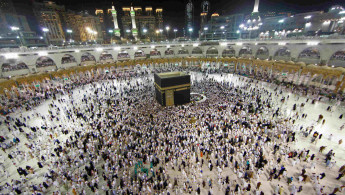Saudi Arabia using Umrah to lure pilgrims into spending more on tourism
Travelers taking part in the Umrah pilgrimage, which can be performed at any time of year outside the official Hajj season, were previously barred from traveling outside of the holy cities of Mecca and Medina.
They were also allowed to travel to the Red Sea city of Jeddah, a travel hub for those making either the mandatory Hajj or optional Umrah pilgrimages.
A royal decree ending the travel restrictions has been prepared, Media Minister Issam bin Saeed told Saudi Arabia's state news agency.
It is also unclear whether the removal of travel restrictions will actually be implemented and Saudi media has previously reported the planned removal of the prohibition on a near-annual basis.
But analysts say the move comes as part of a controversial bid to increase tourism connected to Crown Prince - and de-facto ruler - Mohammed bin Salman's Vision 2030.
The plan hopes to increase the ultra-conservative kingdom's annual number of Umrah pilgrims from eight million to 30 million and encourage pilgrims to visit cities and sites outside of the holy cities in order to boost Saudi tourism revenues.
Planned reforms under Vision 2030 - with tourism a sector earmarked for expansion - have come under fire since the murder of Saudi journalist Jamal Khashoggi last year.
Read more: Saudi Arabia may be about to relax male guardianship over women, but there's a catch
Khashoggi was lured into the Saudi consulate in Istanbul in October, where he was brutally killed and dismembered, allegedly on the orders of the crown prince.
The killing of Khashoggi, jailing of high-profile women's rights activists, and the mass execution of dozens of Shia Saudi citizens have tarnished bin Salman's image as a reformer.
Prince Mohammed has also faced international criticism for Saudi Arabia's leading role in the devastating war on Yemen, which has led to widespread famine and seen thousands of civilians killed in airstrikes.
Several Islamic clerics and scholars have even called on Muslims to boycott the optional Umrah pilgrimage - which unlike Hajj is not obligatory for Muslims - in order not to enrich the Saudi regime's coffers.
Officials, though, have connected the plans to Vision 2030 and it hopes to rapidly increase the numbers of Umrah pilgrims traveling to the kingdom.
"Traveling around the kingdom is an opportunity for pilgrims to visit cultural and tourist sites," Amr al-Maddah, chief planning and strategy officer at the Ministry of Hajj and Umrah, told Arab News.
"They will be allowed to arrive at any port in the country which will facilitate their arrival and expand the capacity to receive more pilgrims."





 Follow the Middle East's top stories in English at The New Arab on Google News
Follow the Middle East's top stories in English at The New Arab on Google News
![The UAE is widely suspected of arming the RSF militia [Getty]](/sites/default/files/styles/image_330x185/public/2024-11/GettyImages-472529908.jpg?h=69f2b9d0&itok=Yauw3YTG)
![Netanyahu furiously denounced the ICC [Getty]](/sites/default/files/styles/image_330x185/public/2024-11/GettyImages-2169352575.jpg?h=199d8c1f&itok=-vRiruf5)
![Both Hamas and the Palestinian Authority welcomed the ICC arrest warrants [Getty]](/sites/default/files/styles/image_330x185/public/2024-11/GettyImages-2178351173.jpg?h=199d8c1f&itok=TV858iVg)